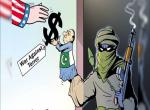Let political considerations and communal pressures not weaken our resolve to the outrage in Mumbai. And let us not sugarcoat our response lest it sends an ambiguous signal to India's enemies. They have sent a message to us loud and clear in 200 dead and hundreds injured and so should our reply be. If Mumbai is not cleaned now, it will be seen only as our weakness and will work as further provocation for terrorists to strike.
Our national security agencies and Mumbai police have some excellent personnel with nerves of steel, high patriotism and professional competence. Very few know their pain and anguish when the system fetters them and they, become placid onlookers to the degradation of India's security which they are able and willing to stem.
These young people are national assets and even a handful of them can make a difference which many battalions cannot. The biggest problem is identifying them and bringing them out of their shells as they surface and sprout only in a particular supportive environment. It is crucial that the leadership has unfailing courage, commitment and competence. Given a task they will accomplish it howsoever daunting it might be, and whatever the risks. The Joint Task Force on Intelligence was designed for this role it needs to be activated.
The law of the land to contain terrorists also needs a re-look. Most of the terrorist acts in India have their planning, preparation, funding and equipment in areas which are outside the reach of our investigators. In most cases, the main perpetrators also escape after the event and cannot be brought to book.
What is available at the scene of crime are only charred, mutilated bodies and debris.There are no eye witnesses or fingerprints which could be placed before courts. Conviction of second-rung operations or over ground supporters becomes difficult even when their association and links with the terrorists are established in the absence of evidence to prove their common intention to cause the terrorist act.
A country which has suffered so heavily from terrorism and continues to be in its vortex deserves much more stringent anti-terrorist laws. It would at least raise the deterrence level for terrorists.
The unending stream of illegal Bangladeshi immigrants finding homes in the length and breadth of India is another source of serious concern. Bangladesh is fast emerging as a new fortress of Islamic extremism and the wrath of its Jehadis is particularly directed against India. Pakistan's ISI is outsourcing its anti-India action to Bangladesh in a big way.
For few terrorists to lose themselves in this human ocean of 20 million Bangladeshis for pursuing their terrorist plans, and then melting away, makes the task of security agencies almost impossible.This demographic invasion has to be stopped on a war footing.
This is why we need to get rid of the moss that accumulates in the system that deals with anti-terror responses.
Lesser the attention to important situations, greater the frequency of emergencies. There is an interest in banking on peoples short memories. This is what exactly has happened in our tackling of terrorism.
The reality is that the number of terrorists operating against India in Pakistan is estimated to be over 4,000. They are freely moving around with impunity and regularly get their doles from their intelligence handlers. Infiltration is continuing and so is uninterrupted supply of weapons and explosives. It is time for us to demand from Pakistan that its intentions will be judged by its actions and not its words.
India has the options but they have no deterrent value as they do not appear to the adversaries as credible and real. The externally controlled infrastructure needs to be demolished both of the underworld and Islamic fundamentalists linked with terrorists.
Can there be anything more tragic than terrorist strikes of July 11 in Mumbai and Srinagar leaving over 200 killed and hundreds injured? Yes, if it passes off as another incident amongst many and remembered only till the dust settles.
However, if it spurs the nation to a new resolve to revisit its strategies, update its security doctrines, and build up new operational capabilities we would have probably gained more than what we have lost.
The author is a former Director of Intelligence Bureau.









Post new comment